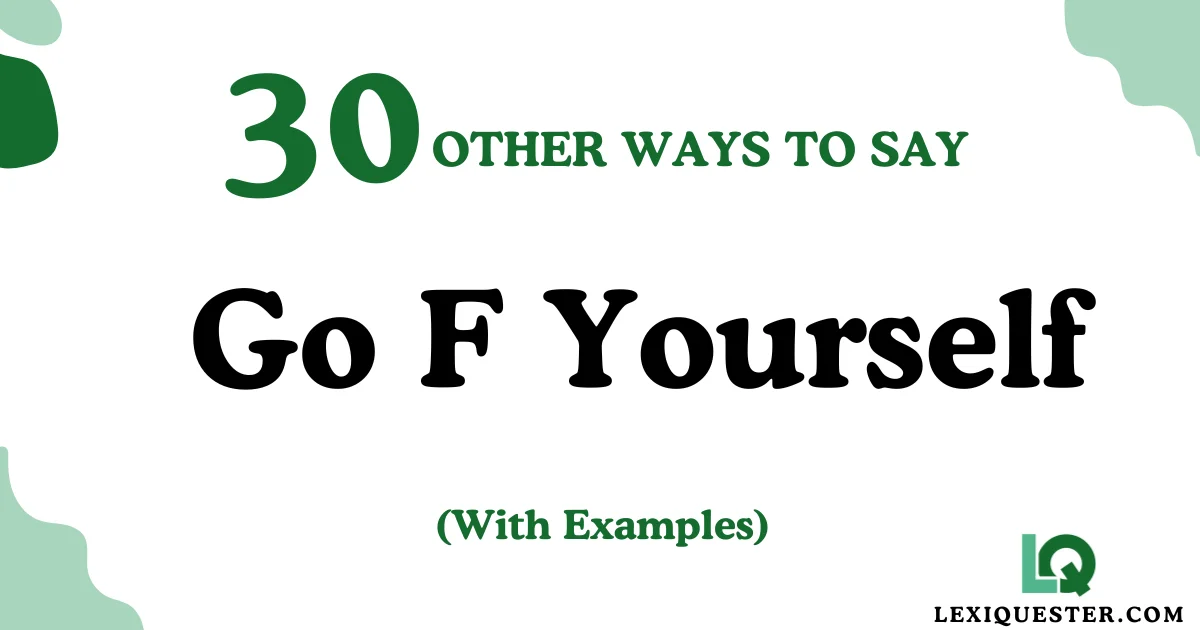We all encounter situations where we feel frustrated or disrespected, leading us to want to express our feelings in less-than-polite ways. However, it’s often more effective to convey our sentiments without resorting to vulgarity.
Here are 30 polite alternatives to the phrase “go f yourself,” each designed to maintain your dignity while delivering a powerful message.
What Does “Go F Yourself” Mean?
The phrase “go f yourself” is a vulgar expression of anger or contempt directed at someone. It suggests that the person should engage in self-pleasure, implying deep disdain or rejection. While it can feel satisfying to say in the heat of the moment, it often escalates conflict rather than resolves it.
When to Use Go F Yourself Alternatives
You might consider using these alternatives when faced with rudeness, betrayal, or disrespect from others. The goal is to express your displeasure while maintaining your composure and avoiding unnecessary drama. These phrases can be especially useful in professional or formal contexts where maintaining your reputation is essential.
Is It Professional/Polite to Go F Yourself?
Using polite alternatives is not only professional but also a way to assert boundaries without damaging relationships or reputations. Opting for a more measured response can help you maintain control of the situation, allowing you to convey your feelings without resorting to hostility.
Go F Yourself Synonyms:
- I Think It’s Best We Part Ways
- I Need Some Space
- I Don’t Appreciate Your Behavior
- I Think You Should Reevaluate Your Actions
- Let’s Agree to Disagree
- I’m Not Interested in Engaging Further
- I Value My Peace Too Much
- Your Perspective is Not Helpful Right Now
- I’d Rather Not Engage in This
- I Think It’s Time to Move On
- I Find Your Comments Distasteful
- Your Attitude is Unacceptable
- I Don’t Tolerate Disrespect
- I Choose to Walk Away
- I’m Not Here for This
- I Believe We’re Going in Circles
- I Prefer to Keep Things Positive
- This Isn’t a Productive Discussion
- I Think It’s Time for a Break
- Let’s Keep It Civil
- I’ll Pass on This One
- I Need to Focus on Myself
- I Choose Not to Engage
- I Don’t Think This is Productive
- I Believe We’re Done Here
- This Isn’t Working for Me
- I Can’t Entertain This Behavior
- I Prefer to Keep My Distance
- I’m No Longer Interested
- Let’s Part on Good Terms
1. I Think It’s Best We Part Ways
Meaning: Suggesting a separation or end to the relationship
Explanation: A dignified way to indicate that continuing the relationship is not in your best interest.
Example: “Given our differences, I think it’s best we part ways.”
Tone: Firm and respectful
2. I Need Some Space
Meaning: Requesting distance from the person
Explanation: Implies that you are stepping back from the interaction due to discomfort.
Example: “I need some space to process what’s happened.”
Tone: Calm and assertive
3. I Don’t Appreciate Your Behavior
Meaning: Addressing disrespectful actions directly
Explanation: Clearly stating your feelings without resorting to insults.
Example: “I don’t appreciate your behavior in this situation.”
Tone: Direct and assertive
4. I Think You Should Reevaluate Your Actions
Meaning: Encouraging self-reflection
Explanation: A diplomatic way to suggest that the other person reconsider their behavior.
Example: “I think you should reevaluate your actions and how they affect others.”
Tone: Constructive and reflective
5. Let’s Agree to Disagree
Meaning: Acknowledging differing opinions
Explanation: Indicates a desire to avoid further conflict and move on.
Example: “Let’s agree to disagree and leave it at that.”
Tone: Peaceful and composed
6. I’m Not Interested in Engaging Further
Meaning: Declining to continue the conversation
Explanation: Politely withdrawing from the interaction.
Example: “I’m not interested in engaging further in this discussion.”
Tone: Firm and polite
7. I Value My Peace Too Much
Meaning: Prioritizing personal peace
Explanation: Suggests that the interaction is detrimental to your well-being.
Example: “I value my peace too much to continue this conversation.”
Tone: Calm and self-aware
8. Your Perspective is Not Helpful Right Now
Meaning: Dismissing unhelpful input
Explanation: Points out that their opinion is not constructive at the moment.
Example: “Your perspective is not helpful right now, so I’ll take a step back.”
Tone: Firm but civil
9. I’d Rather Not Engage in This
Meaning: Choosing to avoid confrontation
Explanation: Expressing a desire to avoid further escalation.
Example: “I’d rather not engage in this type of conversation.”
Tone: Assertive and calm
10. I Think It’s Time to Move On
Meaning: Indicating it’s time to end the interaction
Explanation: Suggesting that the discussion has reached its conclusion.
Example: “I think it’s time to move on from this discussion.”
Tone: Decisive and respectful
11. I Find Your Comments Distasteful
Meaning: Expressing disapproval of their remarks
Explanation: Clearly stating that their words are unacceptable.
Example: “I find your comments distasteful and uncalled for.”
Tone: Direct and forthright
12. Your Attitude is Unacceptable
Meaning: Pointing out that their behavior is inappropriate
Explanation: A direct approach to address disrespect.
Example: “Your attitude is unacceptable in this situation.”
Tone: Firm and unyielding
13. I Don’t Tolerate Disrespect
Meaning: Establishing personal boundaries
Explanation: A way to express that you won’t accept disrespectful behavior.
Example: “I don’t tolerate disrespect, and that’s why I’m stepping back.”
Tone: Assertive and clear
14. I Choose to Walk Away
Meaning: Deciding to remove yourself from the situation
Explanation: A strong declaration of your choice to disengage.
Example: “I choose to walk away from this interaction.”
Tone: Resolute and confident
15. I’m Not Here for This
Meaning: Declining to participate in negativity
Explanation: Indicating that you refuse to engage in unpleasantness.
Example: “I’m not here for this kind of interaction.”
Tone: Firm and candid
16. I Believe We’re Going in Circles
Meaning: Suggesting that the conversation is unproductive
Explanation: Implies that continuing the discussion is futile.
Example: “I believe we’re going in circles, so let’s stop here.”
Tone: Calm and rational
17. I Prefer to Keep Things Positive
Meaning: Advocating for a more positive interaction
Explanation: A gentle way to reject negativity.
Example: “I prefer to keep things positive, so I’ll be stepping back.”
Tone: Optimistic and assertive
18. This Isn’t a Productive Discussion
Meaning: Identifying unhelpful dialogue
Explanation: Acknowledging that the conversation is not yielding positive results.
Example: “This isn’t a productive discussion, so I’ll take a break.”
Tone: Constructive and clear
19. I Think It’s Time for a Break
Meaning: Suggesting a pause in the conversation
Explanation: Politely indicating the need for a timeout.
Example: “I think it’s time for a break from this conversation.”
Tone: Calm and composed
20. Let’s Keep It Civil
Meaning: Requesting a more respectful tone
Explanation: Encouraging politeness in the conversation.
Example: “Let’s keep it civil, as I’m not interested in hostility.”
Tone: Polite and assertive
21. I’ll Pass on This One
Meaning: Declining to participate
Explanation: A casual way to express disinterest in the current situation.
Example: “I’ll pass on this one; it’s not worth my time.”
Tone: Light-hearted and disengaging
22. I Need to Focus on Myself
Meaning: Prioritizing personal well-being
Explanation: Indicating that you need to take care of your own needs.
Example: “I need to focus on myself right now, so I’ll step away.”
Tone: Reflective and self-aware
23. I Choose Not to Engage
Meaning: Opting out of the conversation
Explanation: A polite way to withdraw from negativity.
Example: “I choose not to engage in this type of dialogue.”
Tone: Decisive and firm
24. I Don’t Think This is Productive
Meaning: Addressing the unhelpfulness of the conversation
Explanation: Implies the discussion is going nowhere.
Example: “I don’t think this is productive, so I’ll exit the conversation.”
Tone: Honest and direct
25. I Believe We’re Done Here
Meaning: Concluding the discussion
Explanation: A strong way to signal the end of the conversation.
Example: “I believe we’re done here; let’s move on.”
Tone: Assertive and final
26. This Isn’t Working for Me
Meaning: Acknowledging a failed interaction
Explanation: Expressing that the current dynamic is not beneficial.
Example: “This isn’t working for me, and I think we should stop here.”
Tone: Honest and self-aware
27. I Can’t Entertain This Behavior
Meaning: Refusing to tolerate poor conduct
Explanation: Clearly stating that disrespect is unacceptable.
Example: “I can’t entertain this behavior any longer.”
Tone: Firm and uncompromising
28. I Prefer to Keep My Distance
Meaning: Expressing the desire for space
Explanation: Politely indicating the need for distance.
Example: “I prefer to keep my distance for the time being.”
Tone: Respectful and firm
29. I’m No Longer Interested
Meaning: Declining to continue the interaction
Explanation: Directly stating that you wish to disengage.
Example: “I’m no longer interested in pursuing this conversation.”
Tone: Clear and assertive
30. Let’s Part on Good Terms
Meaning: Seeking an amicable conclusion
Explanation: Indicating a desire to end the relationship without animosity.
Example: “Let’s part on good terms and move forward.”
Tone: Diplomatic and hopeful
Conclusion
While it can be tempting to resort to harsh language when faced with disrespect, these polite alternatives offer a more constructive and dignified way to express your feelings.
By choosing words that convey your message without resorting to rudeness, you can maintain your integrity and foster a more positive environment for yourself and others.
Recent Posts
- 30 Other Ways to Say “Good Girl” (With Examples)
- 30 Other Ways to Say “Sleep Well” (With Examples)
- 30 Other Ways to Say “Talk to You Soon” (With Examples)
- 30 Other Ways to Say “No Way” (With Examples)
- 30 Other Ways to Say “Hit It and Quit It” (With Examples)
- 30 Other Ways to Say “I Have No Idea” (With Examples)














